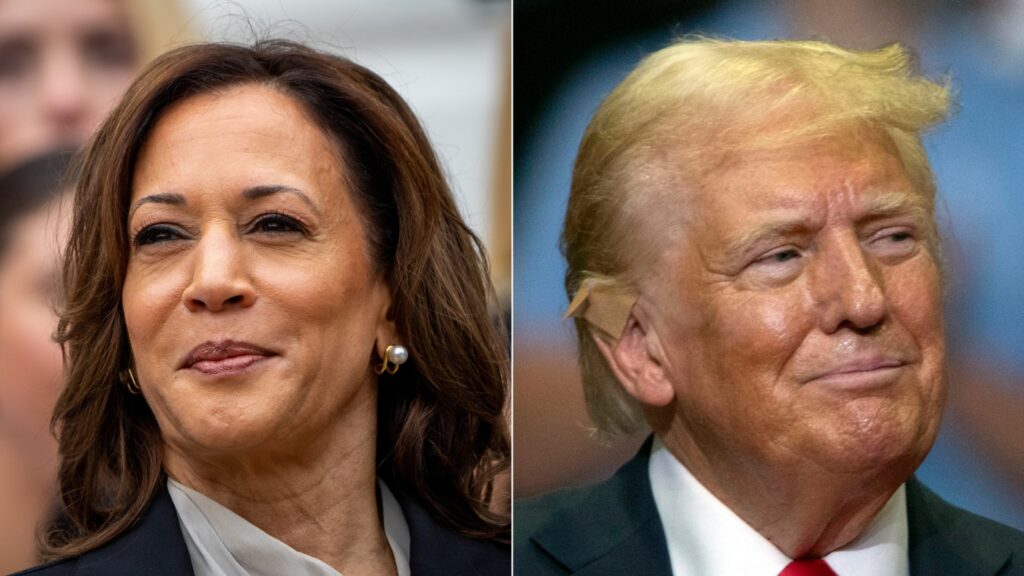
With the U.S. presidential election just eight days away, Kenyan Americans are watching closely as former President Donald Trump and Vice President Kamala Harris vie for the presidency. This election is pivotal for American citizens and holds significant implications for the Kenyan American community, affecting everything from immigration policies to U.S.-Kenya relations. In this article, we’ll explore what each candidate represents, how the election may impact the immigrant community, and what Kenyan Americans should expect in the coming weeks and months.
Donald Trump, representing the Republican Party, brings a familiar “America First” agenda, emphasizing tighter borders and stricter immigration policies. His skepticism toward mail-in voting—asserting that it poses risks for election integrity—highlights his focus on election security. Trump advocates for restrictions on absentee and mail-in voting, preferring in-person voting to limit potential voter fraud. In contrast, Kamala Harris, the Democratic candidate, views mail-in voting as an essential tool for increasing voter participation. Harris’s campaign promotes accessibility and aims to expand voting options for all Americans, including those with mobility challenges or who live in remote areas.
These contrasting perspectives on voting are critical, especially in key battleground states where even a small shift in the electorate can have outsized impacts. The primary battlegrounds for this election—Arizona, Georgia, Michigan, Nevada, North Carolina, Pennsylvania, and Wisconsin—are where both parties will concentrate their efforts. Participation could influence the election’s outcome for the Kenyan American community, particularly those living in swing states like Georgia, Michigan, and North Carolina.
Kenyan Americans are dispersed throughout the United States, but certain states have notably higher Kenyan populations. Texas, home to over 14,000 Kenyans, leads the list, followed by California, with over 8,000, and Minnesota, a state where Kenyan culture has taken root in communities like Minneapolis. Other states with notable Kenyan populations include Washington, Maryland, New York, and my home state of Massachusetts. This distribution underscores the crucial need for targeted voter outreach in areas where the Kenyan American community is particularly prominent.
Immigration is at the heart of this election, particularly for the Kenyan American community. Under Trump’s previous administration, immigration policies became more restrictive, with increased deportations and tighter rules around asylum and visa processes. A second Trump term could mean a continuation of this approach, impacting future Kenyan immigrants and those seeking family reunification. These policies could be a barrier for Kenyan American families hoping to bring relatives from Kenya to the U.S.
Harris’s platform includes expanding pathways to citizenship, streamlining visa processes, and rolling back some of Trump’s restrictive measures. Her stance aims to facilitate family-based immigration and create more predictable legal processes for asylum seekers, a policy approach that could directly benefit Kenyan American immigrants seeking stability and family cohesion in the U.S.
Beyond domestic policy, U.S.-Africa relations are a critical factor in this election. Under a Trump administration, the focus will likely remain on economic gains and strategic partnerships. Trump’s previous term saw discussions around the U.S.-Kenya Free Trade Agreement, aiming to boost trade while securing favorable conditions for American businesses. However, critics argue that the “America First” approach prioritizes U.S. interests at the expense of African developmental goals. If Trump wins, a similar emphasis on trade deals could persist, impacting Kenya-U.S. economic ties.
Harris, by contrast, promises a multilateral approach, focusing on rebuilding diplomatic alliances and development aid. A Harris administration would likely engage more deeply with African nations, including Kenya, on shared global challenges such as climate change, public health, and technology. This broader agenda may result in a more balanced relationship between the two nations, expanding opportunities for Kenyan businesses and enhancing Kenyan-American foreign relations.
Comparing U.S. and Kenyan electoral systems for Kenyan Americans highlights the diversity of democratic practices. In the U.S., elections are decentralized, with each state administering its voting process, leading to variations in registration, voting methods, and electoral laws. Mail-in voting has become a focal point in U.S. politics, while in Kenya, voting is more centralized, and campaigns often hinge on ethnic coalitions and regional dynamics.
The U.S. system allows Kenyan Americans to vote abroad via absentee ballots, which is facilitated by well-established processes. In contrast, while Kenya allows dual citizenship and has provisions for its Diaspora to vote, logistical and administrative challenges have historically limited participation. While navigating both electoral systems, Kenyan Americans often face unique challenges in ensuring their political voice is heard in both nations.
As the November 5th election draws closer, Kenyan Americans are weighing the long-term implications of their vote. Trump’s more conservative agenda represents continuity for those who prefer stricter immigration controls and a focus on trade benefits. Harris’s progressive approach offers an alternative vision, promising more inclusive policies for immigrants and a renewed emphasis on America’s global leadership, which could enhance Kenyan-American foreign relations.
This election, therefore, is not just a question of who will occupy the White House but what kind of America will engage with Kenya and the broader African continent. The choice between Trump and Harris encapsulates two very different visions for the future, with implications that extend far beyond American borders, reaching into the daily lives and futures of Kenyan Americans and their families.
As Kenyan Americans prepare to cast their ballots, the urgency of active participation cannot be overstated. With the final countdown to Tuesday, November 5th, Election Day approaching, the decisions made in this election will resonate far beyond the immediate future. From immigration reforms to the U.S.’s role in global partnerships, the stakes are high. Taking the time to vote is a chance to shape policies that will directly impact the Kenyan American community for years to come. Every vote is a step toward ensuring that the voices of the Diaspora are heard and that their unique concerns are represented at the national level.
What are your thoughts on this pivotal election? Share your insights, and let’s continue discussing how these outcomes will impact our future.
